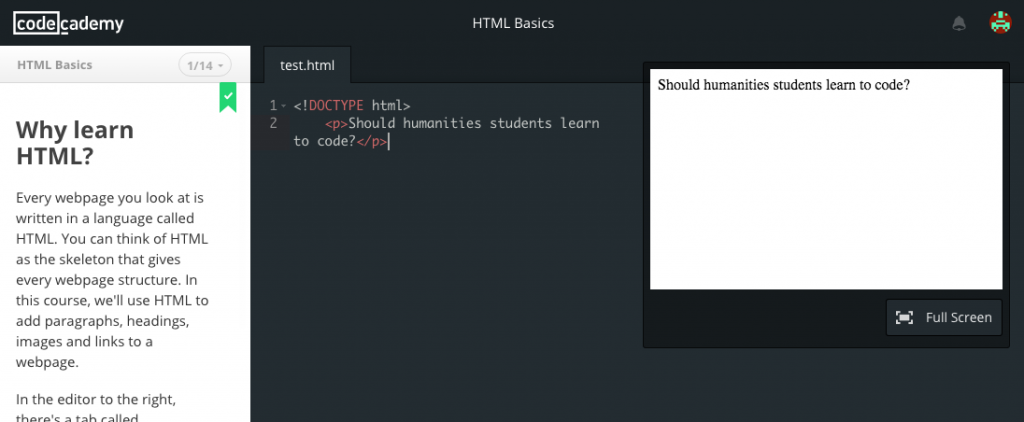“Computers should not be black boxes but rather understood as engines for creating powerful and persuasive models of the world around us. The world around us (and inside us) is something we in the humanities have been interested in for a very long time. I believe that, increasingly, an appreciation of how complex ideas can be imagined and expressed as a set of formal procedures — rules, models, algorithms — in the virtual space of a computer will be an essential element of a humanities education.”
-Matthew Kirschenbaum
In his essay “Hello Worlds (why humanities students should learn to program)”, Kirschenbaum extols the world-building power of computer programming. As I took my first steps in learning to code on Codecademy, I really did feel like a tiny world-builder. Even knowing just a few basics in html, CSS, and JavaScript enabled me to create in a new way; making words and images appear on the screen and changing their color and format is simple, but they’re important tools in making an idea come to life. But despite the doors this knowledge opens for me, I fall into the camp of Evan Donahue, who argues that collaboration between the humanities and computer sciences does not exclusively take the form of humanities students learning to code. “Learn to program whenever it is convenient,” he writes, “but start thinking about the computer sciences as relevant areas of concern right now.”
Actually, I would go a step beyond Donahue. What I felt Kirschenbaum and Donahue did not emphasize enough was that the humanities have just as much to bring to the table in their relationship with computer sciences. Tim Hitchcock’s piece “Academic History Writing and the Headache of Big Data” illustrates this very well, and strongly resonated with my coding experience. In his experience, “however compelling the process [of building projects through computer science], it does not normally result in the kind of history I do.” Like him, I realized that for me the process of building worlds was as exciting as Kirschenbaum found it, but without keeping in mind the kinds of theories and perspectives I have learned in my studies of the humanities, it is easy to lose track of my goals and instead get caught up in coding just for the sake of it.
Hitchcock notes that this is especially important since his work is Marxist “history from below”, but the format and common uses of digital humanities technology often leads him and others into the more prevalent “history from above”, i.e. focusing on famous figures rather than experiences of common people. Additionally, he found himself building projects with the assumption that the users would be well-versed in technology, rather than following his original goal of accessibility. As someone in the field of feminist studies, these issues of representation and access are very important to me too. All in all, collaboration between the humanities and computer sciences can take many forms, but it is enhanced both by a knowledge of programming and a knowledge of humanities theories and methodologies.

I think this is a pretty important point you make here, that coding in and of itself can be amazing, but should be used in collaboration with computer science. Even though I fall pretty heavily on the “humanities students should code” side, I think that in general they should be used to supplement one another. Everyone should learn to code a little, of course, but everyone should also have some pretty basic understanding of humanities as well!
I totally agree with you in that programming enhances a humanities student’s relationship with computer science, but doesn’t exclusively define it. That’s really important to note especially since there are so many facets to computer science and using computer science to understand/build the world around us. And ignoring all of those other facets undermines the importance of converging the humanities with computer science.
I really like the point you make, and I totally agree that coding should be used in collaboration with the humanities. I specially agree with your last point “collaboration between the humanities and computer sciences can take many forms, but it is enhanced both by a knowledge of programming and a knowledge of humanities theories and methodologies. ”
I like how you take a personal stand in this post (to a small extent). Instead of simply siding with either Kirschenbaum or Donahue, you took their views and ideas to a different level. After reading your post, I now strongly agree that the collaboration between coding and computer science is extremely important, especially when coding poses the risk of “losing track of one’s goals”. In fact, ideally, students should learn to code with a background knowledge of computer science and humanities as well.